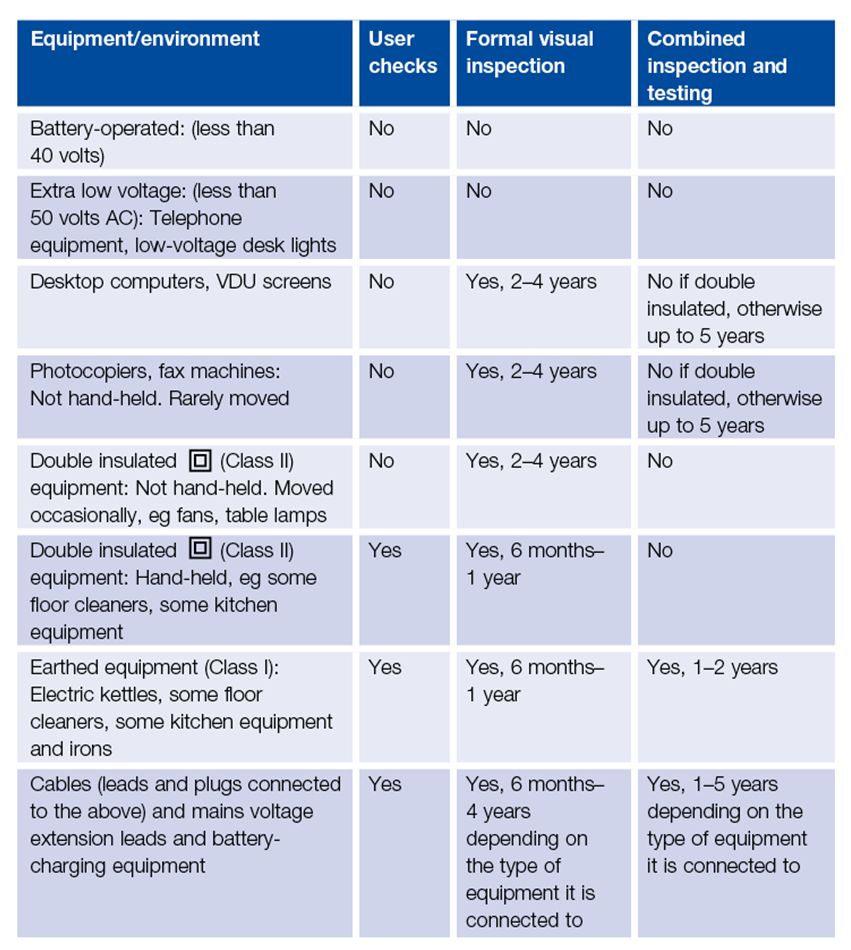As a landlord you may feel inundated by rules and regulations. When the Health and Safety Executive release guidance on electrical testing do you find yourself worrying about where the guidance stops and the legal obligation begins? To be fair, their recent guidance on the maintenance of “portable electric equipment in low-risk environments” is clearly summarised on the HSE site, specifically in a six-page PDF document entitled “Maintaining portable electric equipment in low-risk environments”. It’s free to download and well explained, however does this information, for example, take into account the small print on your commercial insurance policy?
The document does consider the legal view, what it means to ensure the safety of electrical equipment, and the importance and frequency of user checks, visual inspections and PAT inspections.

Figure 1: Suggested initial intervals for checking portable electrical equipment (Copyright HSE)
The HSE guidelines are actually, as they claim, “simple and sensible”, though having claimed that yearly PAT Testing in low-level environments is something of a myth they actually intimate that, in practice, it’s wise to carry on with your tests if you really want to be sure that your insurers are going to look favourably on your policy conditions.
If you take a look at the HSE’s “Suggested Initial Intervals for Checking Portable Electrical Equipment” table (reproduced on this page) it’s fair to say that it does provide a useful guide to what should be tested and when. However, while a PAT tester may not need to be an electrician they certainly need far more knowledge of electrical equipment than this article suggests and they need to know enough to run PAT tests correctly. Do you know the difference between an earth continuity test and an earth leakage test? In addition, although this is a reasonable guide to PAT Test frequencies, it is in the end just that – a guide.
In practical terms do you want to have your PAT tester leave some items for two years, if they are going to be testing other items anyway? Much of this can be resolved with clear PAT testing reports and logs and you will find that this kind of documentation is produced most effectively by a professional PAT inspection machine. You should certainly invest in a machine that can upload data to your PC and provide you with a means to produce professional test reports and logs. Tester.co.uk has a massive range of products, they train people in PAT Testing and all types of electrical installation and they have sales advisers with electrical-testing industry knowledge.
There never has been a specific legal obligation to test portable items. You do, however under the Electrical Equipment (Safety) Regulations 1994 have to make sure that all mains electrical equipment in residential accommodation is “safe”. If there is no actual requirement to test you may wonder why you need to do it. Well, equipment wears out and people use items long after they may have noticed its leaking water near a cable or a wire has come loose. If there is then an accident which is the result of defective wiring or, portable or otherwise, there will be an investigation and an accident can soon become viewed as an offence. Not only do you then have to deal with the law; you’ll soon find that most insurers are reluctant to pay out if they can possibly infer any culpability on your part.
If you’re looking for a crystal clear answer regarding the testing of electrical appliances you will find that the HSE table on this page gives you at least some idea of when the tests should be carried out. Get the tests done by someone who knows what they are doing with a PAT Tester and buy a PAT Tester, or a testing kit, from a knowledgeable supplier such as Tester.co.uk. Make sure that clear test logs are created and maintained for each building, room and item. You should also test portable items that your tenants bring into the property if at all possible.
If in doubt, carry on testing. You have a social duty to your tenants if nothing else. In monetary terms it makes sense to look after your investment. What’s the point of putting your money into bricks and mortar if you’re not going to look after it? This goes as much for fixed wiring as PAT inspections.
Even if you are not employing professional testing contractors, your own professional test equipment (twinned with at least one day of training for you or a staff member) is another good signal to insurers that you care enough about safety to have invested in electrical safety tests.
Written by Bill Earlie at www.tester.co.uk


